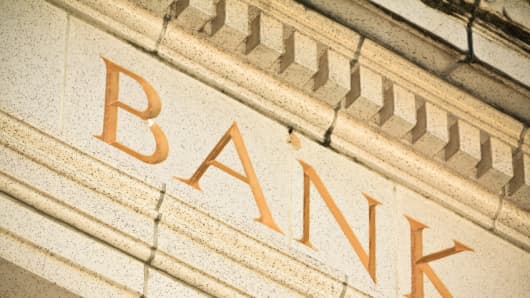Despite their status as a perpetual whipping boy, one prominent analyst thinks the country needs too-big-to-fail banks to survive.
Responding to comments from New York Federal Reserve President Daniel Tarullo , who said in a speech Wednesday that bank size may need to be capped, Dick Bove at Rochdale Securities rejected the notion.
"If a governor of the People's Bank of China had suggested capping the size of these banks and limiting their operating flexibility, it would have been seen as a direct threat to the United States' position in the world — which it is, " Bove, the firm's vice president of equity research, said in a note. "However, this statement was made by a governor of the Federal Reserve — the governor most charged with regulating the banks. It is a threat to our system."
The size of banks has become a pressing issue since the 2008 financial crisis, in which the implosion of Wall Street financial supermarkets threatened to bring down the global economy. Taxpayers had to bail out the firms, but not before such stalwart names as Bear Stearns, Lehman Brothers and Washington Mutual disappeared.
Most recently, JPMorgan Chase , which bought out both Bear Stearns and WaMu during the crisis, has found itself the target of regulatory probes. It is being held responsible for the conduct of Bear Stearns traders who are suspected of fraud related to mortgage-backed securities, and, separately, is under investigation for a large set of trades in its London office that went wrong.
Congress also has responded post-crisis with the Dodd-Frank reform bill, which seeks to unwind banks that have become too big.
The New York Fed's Tarullo said the Financial Stability Oversight Council might have to consider outright caps on the size of banks if "a growing systemic footprint increases perceptions of at least some residual too-big-to-fail quality."
"There is, then, a case to be made for specifying an upper bound, " Tarullo said at a lecture in Philadelphia. "It would be most appropriate for Congress to legislate on the subject."
But Bove, who has been a harsh critic of the Dodd-Frank bill, calls over-regulation a threat to the industry's stability as well as a blow against a U.S. economy that needs large financial companies to compete on the global stage — and to help finance the burgeoning $16 trillion national debt.
"I challenge anyone to explain which major nation in the modern world today or over the past five centuries has operated as a successful sovereign power without too big to fail banks, " he said. "If it cannot be done one should begin to understand the incredible threat being made to this nation by claiming that its biggest banks should be capped in size."
Big banks actually have gotten bigger since the crisis, at least in terms of deposits. The top five banks have $4.34 trillion in deposits now, compared to $3.17 trillion in 2008.
But that may not continue in the current climate.
"Post financial crisis, the dynamics of the industry have changed, " Frederick Cannon, equity strategist at Keefe, Bruyette & Woods, said in a report. "The national franchises are largely set and are bumping up against deposits caps, larger banks no longer have a capital advantage vis-à-vis smaller institutions, small banks (under $1 billion in assets) face outsized costs creating inefficiencies, and there are a dearth of de novo (less than 5 years old) banks."
As a result, Cannon expects a "consolidation to the middle" in which mid-sized banks, with deposits between $5 billion and $50 billion, purchasing smaller counterparts.
KBW analysts identified possible acquirers: CBV Financial, BBN Bancorp, SCBT Financial , City Holding and Berkshire Hills Bancorp , among a handful of others.
"We believe that deal activity will continue to accelerate as asset values become more stable and profitability in the industry remains challenged, " Cannon said. "However, the nature of deal activity is changing post financial crisis due to changes in the industry."
Consolidation now will hinge less on big banks wanting to get bigger and increasingly toward more efficient banks taking on the less efficient, with deals longer-term in nature, he added.
For Bove, the developments mean the U.S. will become less competitive on the global financial stage.
"The People's Bank of China is the biggest financial institution in the world. Its 'private' banks are soaring in size, " he said. "They are now moving around the world to establish China as the number one global financial power. Apparently the Federal Reserve would like to remove impediments to this expansion — i.e., shrink the American banks."
Questions? Comments? Email us at NetNet@cnbc.com
Follow Jeff @ twitter.com/JeffCoxCNBCcom
Follow NetNet on Twitter @ twitter.com/CNBCnetnet
Facebook us @ www.facebook.com/NetNetCNBC



